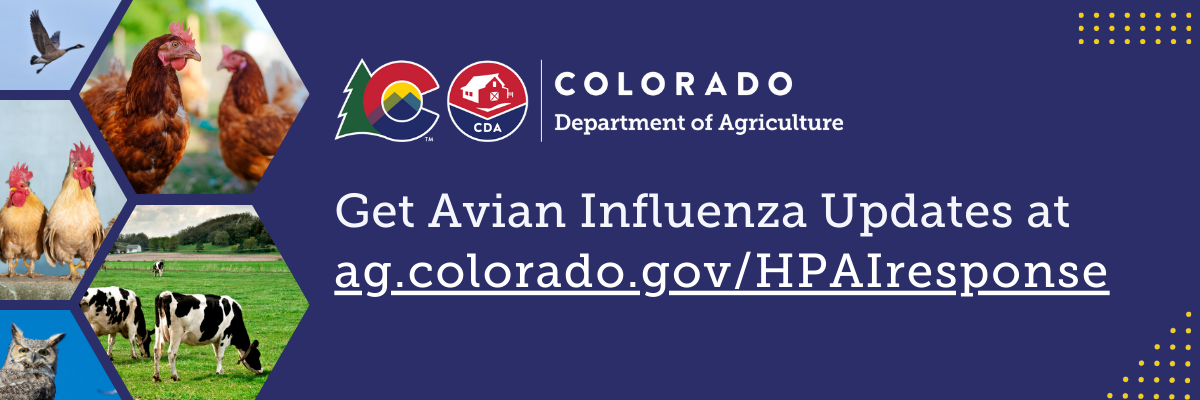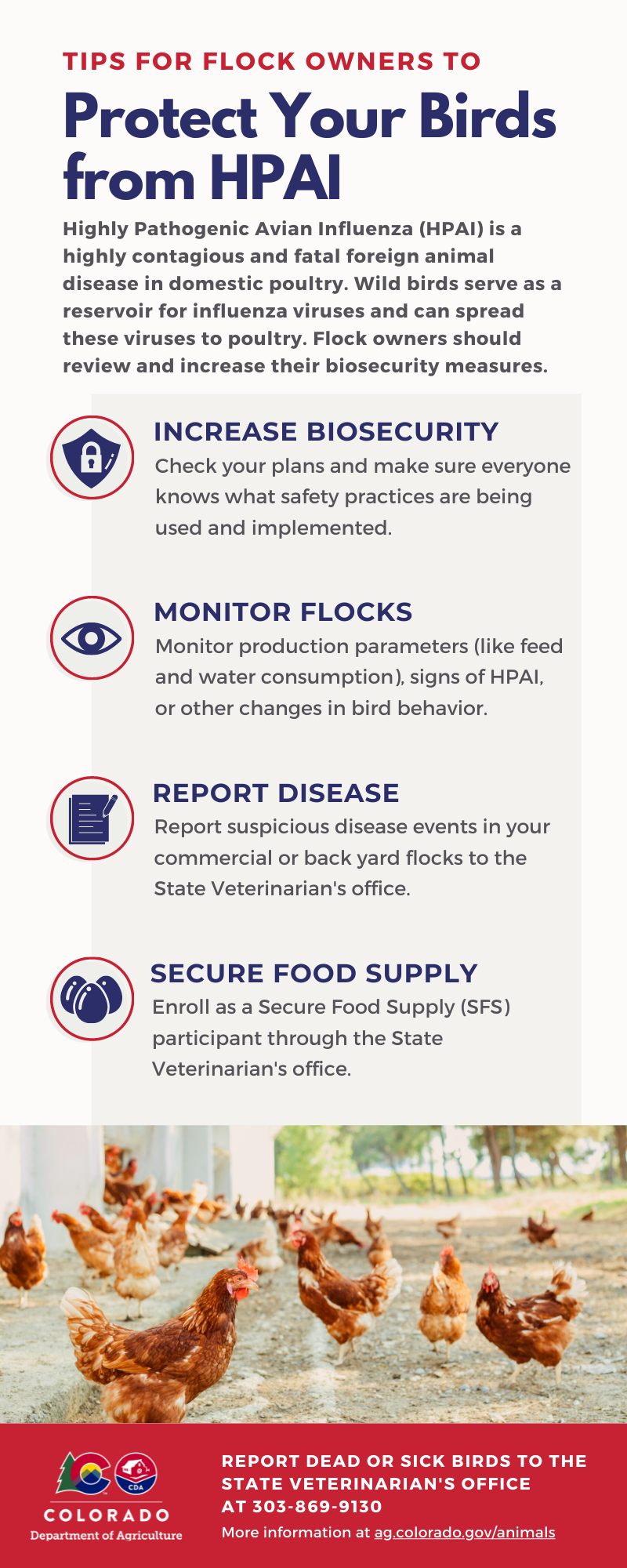HPAI in Poultry
In February 2022, Highly Pathogenic Avian Influenza was detected in wild birds and poultry in the United States. In Colorado, CDA leads the response to the virus, in collaboration with federal, state, and local partners.
For more information of the nationwide detections of HPAI in poultry, wild birds, mammals and other animals, please visit the USDA/APHIS website.

Situation Reports
To update the public on the status of HPAI, CDA releases updates via Situation Reports, which are posted on Fridays with and include information from the preceding week.
Most current Situation Report
Weld 18 Control Area
The USDA’s National Veterinary Services Laboratory (NVSL) has confirmed the detection of Highly Pathogenic H5N1 Avian Influenza (HPAI) virus in a commercial egg-laying facility in Weld County.
The State Veterinarian has issued a Quarantine Order in parts of Weld County to limit movement of birds in and out of the area.
You can review the Order here: Order of Area Quarantine - Weld 18 Control Area
If you are a commercial or backyard poultry owner in the quarantine area, please report the status of your flock to the State Veterinarian's Office through this online form, by calling (303) 869-9130 or emailing animalhealth@state.co.us.
Please note: this information is being collected for tracking purposes only to ensure the health of flocks throughout the Quarantine Area. Your voluntary participation is encouraged so we can follow up with you in case of additional detections of HPAI.
Logan 01 Control Area
The USDA’s National Veterinary Services Laboratory (NVSL) has confirmed the detection of Highly Pathogenic H5N1 Avian Influenza (HPAI) virus in a backyard flock in Logan County.
The State Veterinarian has issued a Quarantine Order in parts of Weld County to limit movement of birds in and out of the area.
You can review the Order here: Order of Area Quarantine - Logan 01 Control Area
If you are a commercial or backyard poultry owner in the quarantine area, please report the status of your flock to the State Veterinarian's Office through this online form, by calling (303) 869-9130 or emailing animalhealth@state.co.us.
Please note: this information is being collected for tracking purposes only to ensure the health of flocks throughout the Quarantine Area. Your voluntary participation is encouraged so we can follow up with you in case of additional detections of HPAI.
What Flock Owners Should Do
Please visit USDA’s Defend the Flock Program to for in depth information about which biosecurity practices can keep your birds safe.
Owners should take the following steps to prepare:
INCREASE BIOSECURITY: It is extremely important for poultry owners to increase biosecurity measures to protect their birds from HPAI. The USDA Defend the Flock website(opens in new window)(opens in new window)(opens in new window) has helpful resources for keeping poultry healthy in any operation. Commercial poultry producers can use this toolkit to assess their biosecurity practices and preparedness.
Learn more about biosecurity
MONITOR FLOCKS: Monitor your flock for clinical signs of HPAI, including monitoring production parameters (feed and water consumption, egg production) and increased morbidity and mortality. Any changes in production parameters that could indicate HPAI should be reported.
SECURE FOOD SUPPLY: We also strongly encourage poultry producers to enroll as a Secure Food Supply (SFS) participant through our office. The most important component of ensuring your continuity of business in the face of a HPAI outbreak is to enroll in SFS and have a biosecurity plan in place. If you would like more information on SFS, please reach out to becky.hoffman@state.co.us or (303) 870-5494.
REPORT DISEASE: Veterinarians, producers, and hobby poultry owners should report any suspicious disease events in poultry flocks to the State Veterinarian’s office at 303-869-9130 or using an online form. If it is after hours, the voicemail message will indicate which veterinarian is on call.
Report sick or dead domestic birds

Struggling with stress around avian influenza?
Bird owners struggling with stress or anxiety around HPAI can contact Colorado Crisis Services by calling or texting 988. Farmers and ranchers can receive a voucher for six free sessions with an ag-competent provider through the Colorado Agricultural Addiction and Mental Health Program (campforhealth.org).
